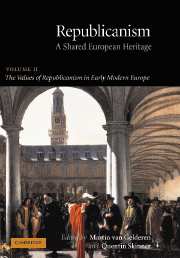Introduction
Published online by Cambridge University Press: 11 January 2010
Summary
The following chapters stand in little need of introduction, since they are all the work of recognised experts on the history and theory of European republicanism. A word does need to be said, however, about the editorial decisions we have made in respect of the topics we have chosen to cover and the chronological limits of our coverage.
Chronologically our two volumes focus on the period roughly extending from the mid-sixteenth to the late-eighteenth century. This reflects our sense that the earlier history of republicanism in the Renaissance, and the later fortunes of the movement in the nineteenth century, have both been better served in the existing scholarly literature. In particular, it is worth noting that several contributors to these present volumes took part in the production of Machiavelli and Republicanism (1990), in which the origins and influence of the Florentine model of the vivere libero were extensively surveyed. The basic decision we made in setting up our more recent network was that the period most in need of further study was the one following the demise of the Renaissance city-republics and preceding the recrudescence of republican theory and practice in the era of the French Revolution.
A word next needs to be said about the specific themes on which we have chosen to concentrate. These reflect our sense of how the values and practices associated with European republicanism can most illuminatingly be made to fit together.
- Type
- Chapter
- Information
- RepublicanismA Shared European Heritage, pp. 1 - 6Publisher: Cambridge University PressPrint publication year: 2002
- 2
- Cited by



